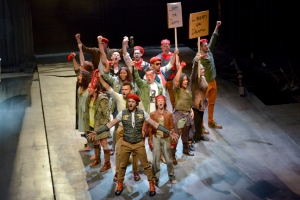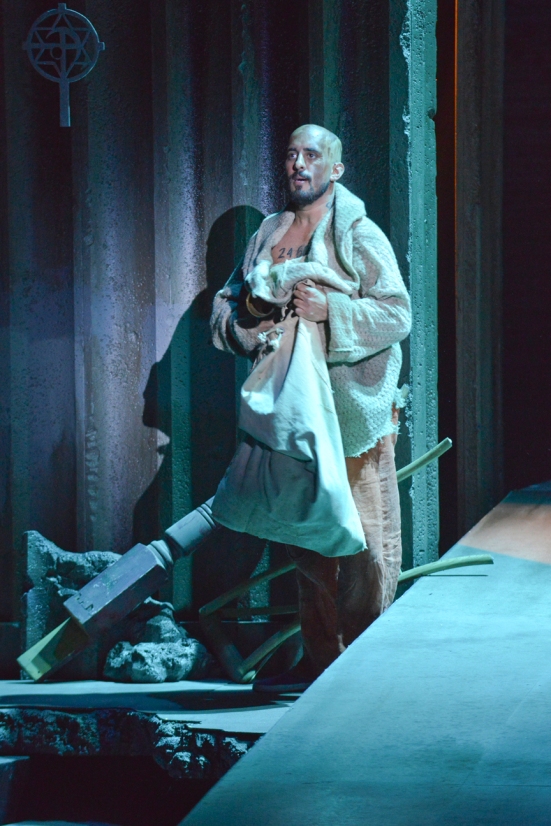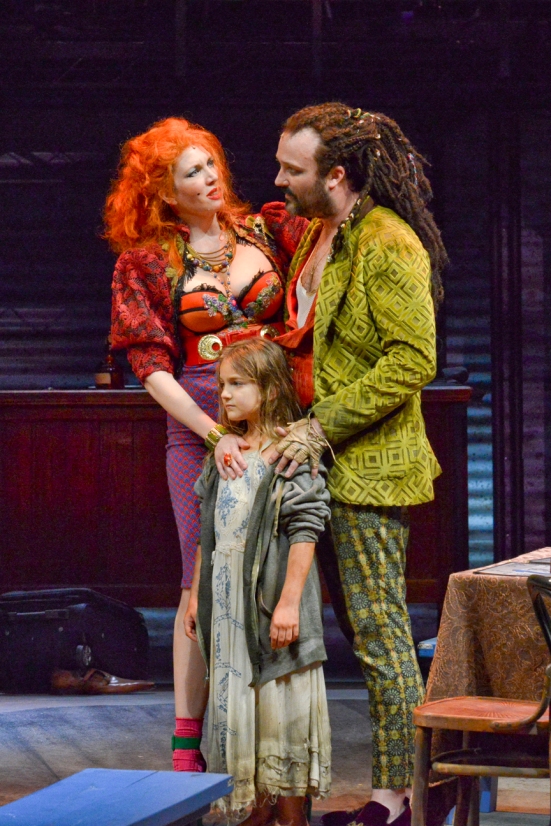I sympathize with the Dallas Theater Center. I comprehend the in depth planning behind their “concept” productions and note their fascination with descriptive words like “new, innovative, modern, and accessible to all”. I get the fact that the powers making artistic decisions there generally don’t seem to trust plays or their characters as written or the ability of their audiences to understand these works without simplification through adaptation or watering down. There must be scads of pressure to put butts into those expensive, back and bum-torturing seats. Today’s audiences want entertainment more in line with reality TV, some believe. Can any Classic give that? At DTC, they gotta do whatever it takes. But why, oh why, did they have to fly Les Miserables’ tragic antagonist Inspector Javert off the orchestra balcony like Peter Pan as his final heart-breaking suicidal gesture? I admit it. I blew a raspberry. Couldn’t stop myself. Talk about being thrown out of the musical’s most deeply moving moment. There he hung in the blackout for a few moments, visibly suspended like a side of beef in a refrigerated meat locker until somebody reeled him back in over the rails. Unforgettable? Unforgivable.
DTC’s young East Coast director import for Les Miserables, Liesl Tommy, has generated considerable discussion due to her candid, defensive interview comments about not ever seeing a production of this musical before directing it. Oddly, she claims to have read the Victor Hugo book but wasn’t affected adversely by the experience. Her generic production of the musical lacks the majesty, maturity and depth of a more historically accurate one. Had she viewed such a production, it might have helped informed hers with needed depth. Part of the genius of Alain Boublil and Claude-Michel Schonberg’s show lies in how the microcosm of Jean Valjean’s troubles nestles within and balances the macrocosm of the destructive aftermath of the French Revolution. It’s specific, not generic. In Tommy’s modern dress version, the macrocosm retreats to a superficial “Occupy” sort of world miasma, allowing the endlessly torchy soap opera of Jean Valjean ‘s crooked path to redemption and family relations to become main focus. I doubt that was Victor Hugo’s or the musical adapters’ intent. The production retains its lyrical, exquisite score, executed handsomely by a twelve-person orchestra suspended over the stage and conducted by Sinai Tabak. It’s not a total loss, by any means, and occasionally becomes ripping good theatre. But generic revolution doesn’t inspire one’s throbbing heart the way a historically based one might, no matter how stirring its music. If Liesl Tommy ever chances to direct Les Miserables again, I hope she’ll see a traditional production beforehand (wear a disguise) and look back on this one as a prime example of youthful enthusiasm lacking the wisdom to bring out its poignant nuance. No real professional jazz musician improvises without knowing how a tune is written, note-by-note, before riffing off into the stratosphere.
Plusses and minuses: Way too much static solo singing. Once decried as the worst aspect of opera, singers piping away isolated in their isolated “vocal bubbles” become pretty boring pretty darn fast. Neither Justin Keyes (Marius) nor Dorcas Leung (adult Cosette) generated any palpable heat together as young lovers and seemed forever disengaged with anything else on stage. Both demonstrated excellent musicianship with solid, well-schooled voices but conveyed strictly interior focus. Edward Watts, the ‘Flying’ Inspector Javert, gave largely concert performance interpretations of his songs. They failed to drive or illustrate his character’s dilemmas or actions, resulting in a largely static, while musically accurate, performance until he took unexpected flight. He sure sounded and looked elegant, statue-like, throughout most of the show. On the other hand, Nehal Joshi made a compelling, sympathetic non-traditional Jean Valjean, revealing his character’s plight, dilemmas and aspirations through well-integrated song, dialogue and action. Similarly, John Campione as Enjolras lit up the stage with warm energy and focused vocal power in this energized secondary role. Both Joshi and Campione made me care about their characters through strong technique and fully developed characters, using the power of the remarkable score to carry their arcs forward.
I have no problem with “color blind’ casting as a rule. I do think casting a Caucasian child as Little Cosette who then grows up to be Asian American adult Cosette stretches the conceit….
A real issue: the offensive, gratuitous portrayal of violence against women. During Act One’s “Lovely Ladies”, male characters rough up the town prostitutes. We get the picture. But in this production, a well-dressed man savagely abuses the character Fantine downstage center, graphically and sexually. For a slow, uncomfortable while. The scene neither needs nor calls for the level of cruelty demonstrated. Where do we draw the line between “acting” and cultural reinforcement? Why is it okay, ‘cool’ even, to keep showing gratuitous scenes of abuse of women on stage? What does this say about the mental health of our culture? What does it do but perpetuate abusing women as a societal norm? When will an actor say, “I don’t feel comfortable portraying this level of violence?” At this moment, in this scene, on this stage, why does the savaging of Fantine need such graphic portrayal?
- Every 9 seconds in the US a woman is assaulted or beaten.
- Domestic violence is the leading cause of injury to women—more than car accidents, muggings, and rapes combined.
- Everyday in the US, more than three women are murdered by their husbands or boyfriends.
http://domesticviolencestatistics.org/domestic-violence-statistics/
What made this three-hour production really worth sitting through? The devilish, delectable,fearless, carnival-esque, cringeworthy, clownish performances by Steven Michael Walters and Christia Mantzke as M. and Mme Thenadier. From the moment this Kardashian-like duo swaggers in, he leering brutishly, flinging back seedy, unkempt dreadlocks and she tottering along in his wake on garish, precariously high stacked heels, you can’t stop watching them, half-charmed, half-repulsed by their non-stop crude antics. These characters provide the play’s carefully orchestrated social commentary laced with greasy dollops of comic relief. If only the rest of the show had provided half as much of a glorious theatrical experience. When Walters and Mantzke return in Act Two for “Beggars at the Feast”, attired brazenly in full-on, white thrift store kitsch ensembles head to toe, and incorporate the play’s wedding guests into a Macarena-style chorus line, I expected audience members to jump up and join in… wanted to, myself. (Splendid costume design by Jacob A. Climer; wigs and make-up: Rob Green, J. Jared Janas)
It’s pure heaven to enjoy the musical score of Les Miserables live and watch talented, confident Nehal Joshi follow Jean Valjean’s distinguished path to redemption. Act One’s violence may not be appropriate for children or the easily offended. It runs through August 17, 2014 at the Dee and Charles Wyly Theatre.
TICKETS: 214-880-0202 www.dallastheatercenter.org
Photos by Karen Almond



You made me laugh. I love how you blow high and mighty. Nothing like literate high dudgeon:) I wish I could see Walter’s Threnadier but will have to imagine it. Saw the first NYC production. The death of Javert was one of the most heart striking moments. Your description of Javert’s death made me laugh out loud. I am almost finished with my first novel based on The Early Education of Conrad Eppler. Very intense, focused daily writing and rewriting. Don’t know when I will or, if I will return to the theatre scene. Well, I put two 1 minute plays in the Kitchen Dog deal…on my current topic of obsession: children refugees. Once Elliott was Cancer free…I let myself be immersed in in my writing, closing in on 90,000 words. I am having a blast with the open world of my novel. The old biblical god has been turned in to a cassowary and is the pet of one of the nuns at the convent:). I hope you and your animals are doing well! isabella
Isabella Russell-Ides “Theater is a service where the gods keep changing.” Maria Irene Fornes 2013 LYDIE MARLAND IN THE AFTERLIFE A WATER STORY The Red Dress0o 2012 The Early Education of Conrad Eppler BIG SHOUT OUT WINNER, ECHO THEATRE PRODUCER 2011 Beeing There (Botanicum Seedlings) 2009 Nora’s Playhouse NYC OUTSTANDING NEW PLAY: Leonard’s Car 2008 DFW Critics Forum BEST NEW PLAY: Coco & Gigi
Date: Tue, 8 Jul 2014 04:57:45 +0000 To: queenofspain@msn.com
LikeLike